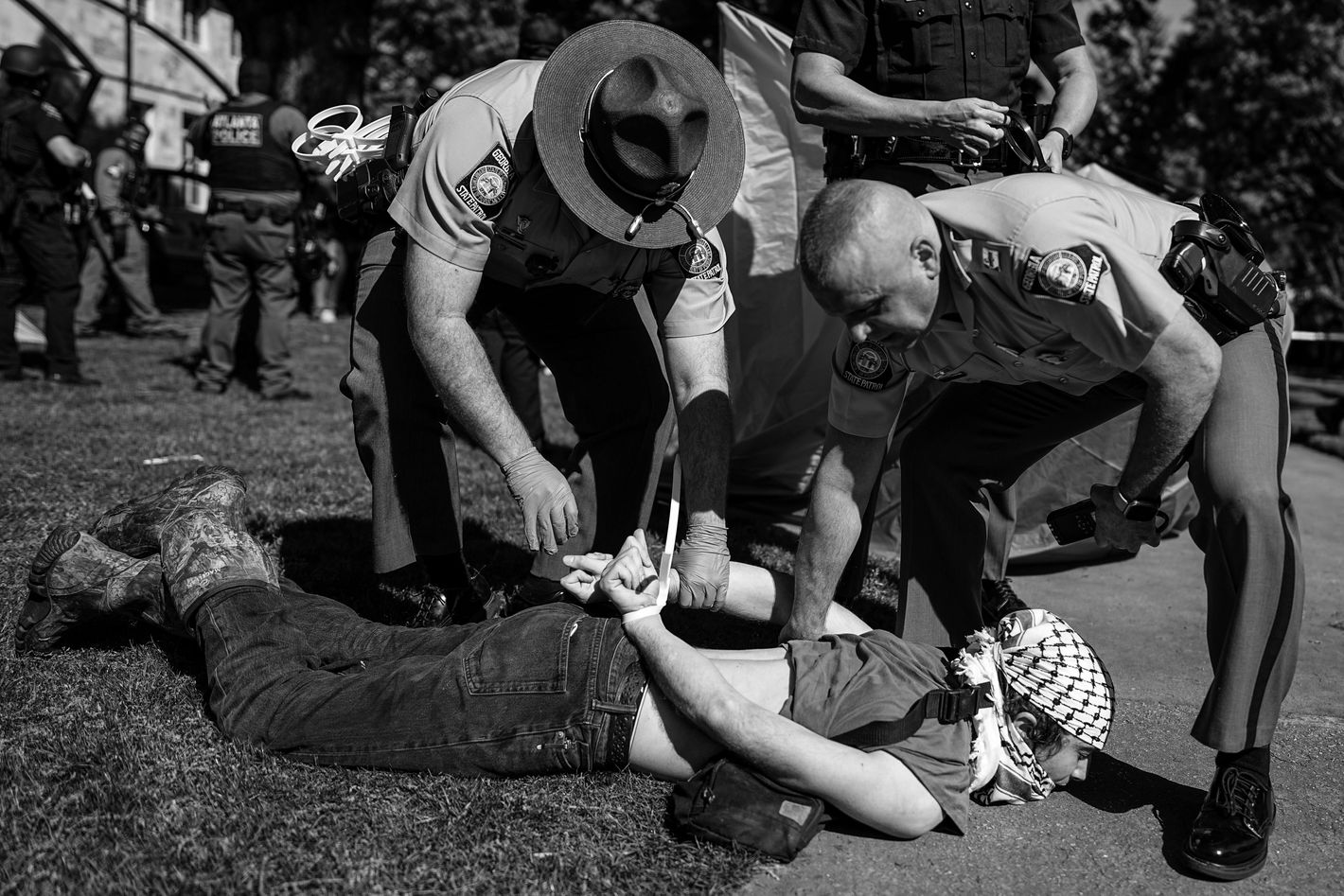[ad_1]

When a group of Emory University students gathered on their quad for a peaceful protest on April 25, their main request was the same one that’s echoed across college campuses for weeks: That the school divest from companies helping to fund Israel’s war in Gaza. In a statement on their action, the organizers — self-identified as “students across multiple Atlanta universities and community members” — also called for their institutions to cut financial ties with Cop City, a massive law-enforcement training camp under construction on a swath of local forest which uncannily resembles the Israeli Urban Warfare Training Center. Staged amid a small cluster of tents, the demonstration met immediate pushback from the Atlanta police officers and Georgia state troopers Emory’s administration called in to clear the encampment from its lawn. The student-run Emory Wheel reported that police arrived with rubber bullets, stun guns, and tear gas, violently deploying their weapons against a crowd the university would subsequently accuse of “trespassing” and “disrupting” final exams.
Noëlle McAfee, the chair of Emory’s philosophy department, was not among the faculty participating in the protest but watched from the edges. After shouting at the cops to stop assaulting a student, she says, she found herself in handcuffs. A Ph.D. student captured the arrest on video, which shows a masked officer towing McAfee down the sidewalk. She now has a court date for a disorderly-conduct citation and has joined fellow tenured faculty members in signing a vote of no confidence in university president Gregory Fenves over his mobilization of police against the student body.
Fenves has claimed in a series of statements that the administration believed at the time that outside actors were responsible for the protest. He has promised a “thorough review” of the events and “how Emory engages external law enforcement agencies.” But for McAfee, whose research focuses on democratic theory and psychoanalysis, Emory’s response — and the response of so many universities around the country, where more than 2,000 arrests have been made since mid-April — is a frightening one. Protesting students, she says, are performing a vital democratic function: To place what they see as a massive public problem on the national agenda. “It’s not just free expression for the students,” she says. In an interview that’s been lightly edited for length and clarity, McAfee talks about the violent police response to the protests and what comes next.
How would you describe the atmosphere on campus and the atmosphere at the encampment?
I showed up at about 10 o’clock. It’s a beautiful blue day. The weather’s perfect. There’s faculty milling around chatting. There were some students, maybe 30, 35, in this little quadrant. There are some tents and they’re doing the usual chants. I said to a colleague, “At least the APD aren’t here.” He said, “Oh, they are here.” He pointed to the other side, and at that moment, we see the Georgia State Patrol come in. They’re filing in with their little hats, a really long, intimidating line of them.
When they got down to about the area where I am, they stopped, and then they attacked. It was like an ambush. They had contained the students into this one quadrant of the quad. They trapped them and immediately became very violent. I see this kid on the ground, a young African American woman, and they’re just pummeling her. It was horrible. This is going up for 10, 20 seconds. I start yelling “Stop,” and one cop looks up. He says, “Ma’am.” Then he stands up and he gets in front of me and says, “Ma’am, you need to step back.” I said no, and he arrested me. He handcuffs me and just starts dragging me around the corner down to the end of the quad, and then behind the theology building where there were the paddy wagons all lined up. I didn’t talk with him.
My feeling is that a police response like this makes dialogue, or anything like a discussion of opposing viewpoints, pretty much impossible. It irrevocably escalates the situation. And I would imagine that for a professor, that could be pretty frustrating, because that dialogue is what you want to foster.
It was extremely traumatic to our community, not just people who were there. It’s been awful. And if you look from a wide angle at how a well-functioning — or at least a decently-enough-functioning democracy — works, there are some important things that the public needs to do. One is to put things on the public agenda. Think back to the sixties: It was environmental activists, authors, writers, scientists who were going, wait, the birds aren’t singing anymore. There’s something wrong here. They were the warning sensors. That information about what’s an important public policy agenda item came from outside the government.
Over the past 80 years or so, students have been part of that ecosystem, noticing what needs to be addressed. Students raised the alarm about what we were doing at war in this little country in South Asia in the sixties. When I was a college student, we raised the alarm: What are our universities doing supporting companies that invest and support apartheid in South Africa? And now this generation is saying, What are we doing with our university supporting a regime that seems to be committing a genocide? You can disagree with the way those things are put, but whatever it is, those students are putting something on the public policy agenda. They’ll have their demands, but what they’re actually doing is, I think, demanding you pay attention: This is an important issue.
From your perspective, how could Emory better respond to these protests?
For some reason, the Emory administration has had its doors locked for weeks. I’m just going to extrapolate, but it seems like they’re feeling a little besieged, under attack. They hear that people are gathering, they’re going to set up an encampment. They feel all the more paranoid, so they call on the police to destroy it. It’s an archaic, childlike defense. But it destroys spaces for the students to begin to grapple with the complexities of the issue, too. If they can’t even begin to have a demonstration, they’re not going to get to the next stage possibly of having teach-ins and all of that. This issue is complicated. It calls for more talking, more deliberation, more teaching.
In a meeting earlier this week, I said to the president of the university, Why didn’t you go to REI and get a tent and go sit with the students? That would be the response: engage in the dialogue. Right? Y’all want something from us? Well, we might find it hard to do that. Let’s tell you why. Just start a conversation instead of calling in militarized police to assault them and disband them.
It’s this overreach, really interfering with the faculty’s teaching mission. I am a full professor with tenure, so I can speak like this, but a lot of faculty do not have tenure or are in more precarious positions. It’s harder for them to speak up. I feel this obligation to speak up, even though it’s not going to endear me with the people higher up at all.
I imagine this is a uniquely complex moment to teach, and to teach through. How are you talking about it with your students?
My students right now, they’re freshmen, so they’re 18 and 19 years old. They just got to college. Many of the students feel like they don’t see their faculty standing up for them, so that video of me being arrested, going so viral — they’ve all seen me. I think it’s so important for them to feel supported. This happened right before the last day of class for me. I didn’t get to hold my last session. Some of my students have written to me, thanking me. I ran into a couple of others and they were, I think, grateful. I think the larger thing that we’re able to model and teach is to be civically engaged and not afraid. This is not how I planned on ending the semester, but it’s not a terrible lesson.
Emory faculty members are considering a vote of no confidence in the university president, if they haven’t voted for one already. What happens next?
It’s just a statement. It has no juridical power, but it is a powerful statement. It’s hard to see how an administration can stay in power when it’s lost its legitimacy among the constituents. I don’t know what’ll happen. It’ll be up to the board of trustees, really. But when the administration cannot establish its own legitimacy, when legitimacy is something that can only come from outside, if the faculty says we do not recognize you to be the legitimate leader of this university, it sends quite a signal.
Where do you think universities go from here?
Well, it depends on what people do. What I’d like to do, if I have the energy, is try to organize with faculty at other universities to establish some general principles saying that we will not tolerate our administrations doing this. This is not what we’re about. We could create another chapter of the story where faculties around the country communicate and develop strategies to help educate our administrations on how they ought to behave, stay in their lane. That would be good, but I don’t know what’ll happen.
[ad_2]
Claire Lampen , 2024-05-03 23:55:19
Source link



